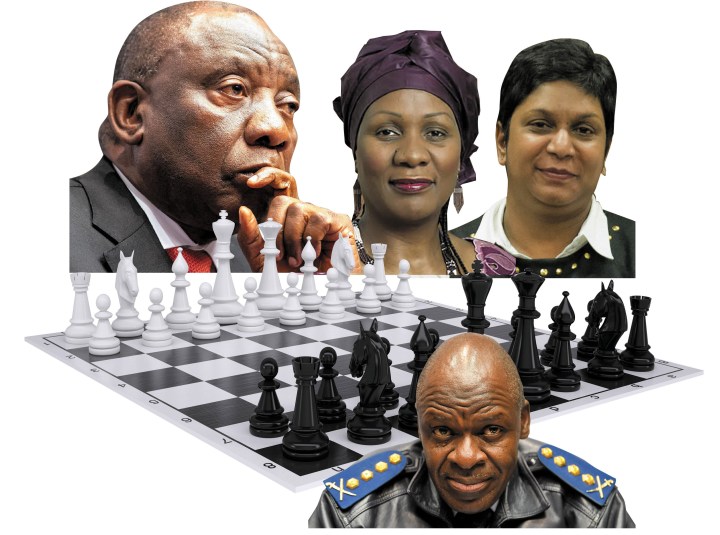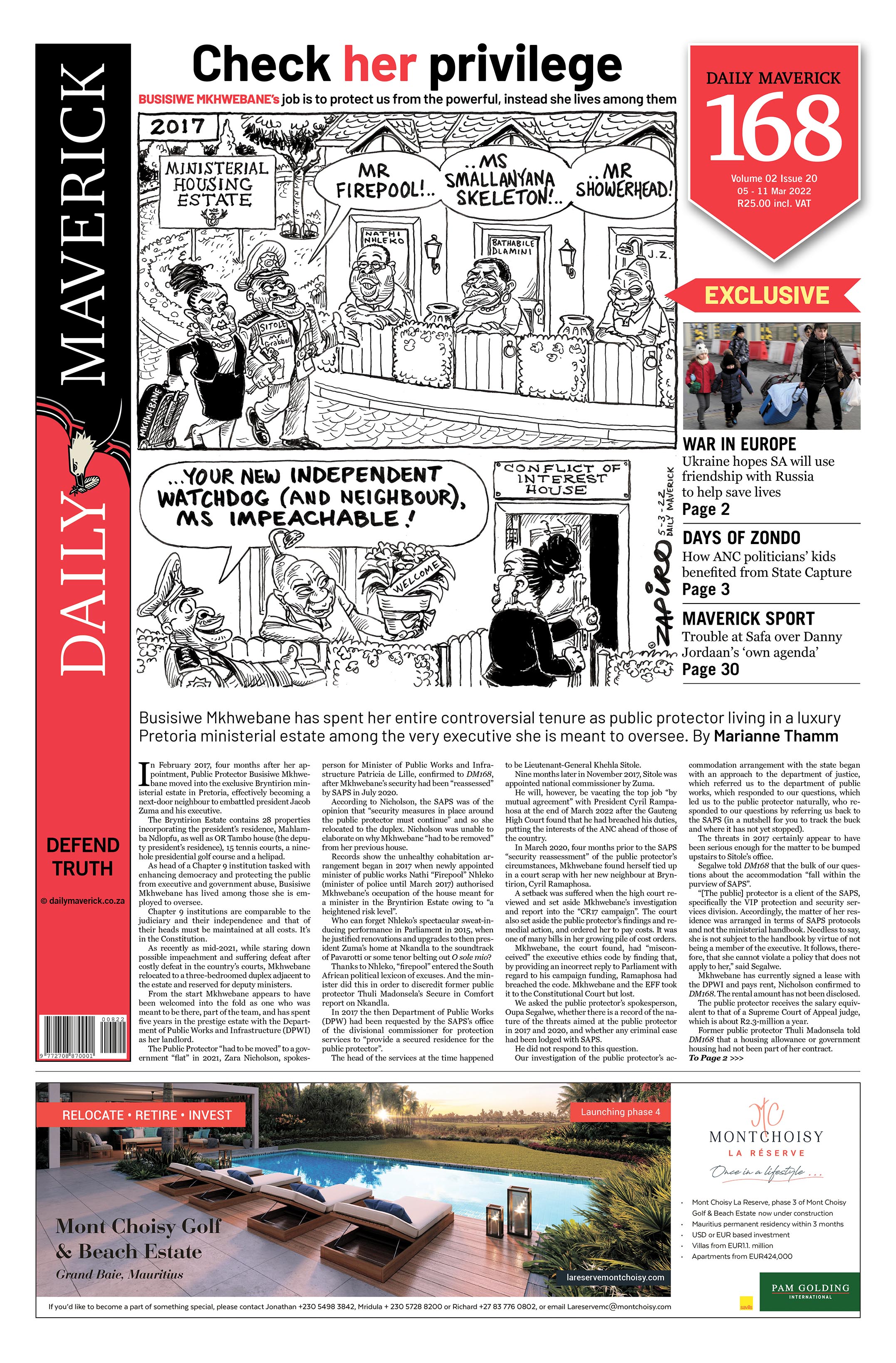ANALYSIS
State Capture ghost haunts Ramaphosa’s security cluster reshuffle

Over three days, President Cyril Ramaphosa appointed new people to top jobs in the security set-up, further separating his government from Jacob Zuma’s. How will this affect crime fighting?
In just three days the face of South Africa’s security sector changed dramatically, with long-awaited announcements of new bosses in the intelligence, policing and prosecuting arenas.
These critical areas were significantly weakened during the State Capture years under Jacob Zuma’s presidency and have needed strong, untainted leadership.
Although there are concerns that State Capture cronies are still lurking, deeply embedded in a government that is too frail and poorly resourced to smother their activities, there is also hope in policing circles that the changes President Cyril Ramaphosa announced will equate to more than just another set of individuals trying to steer massive and messy departments towards firmer ground.
It is hoped these appointments will have a broad, domino effect and see other important vacant positions filled, that some controversially sidelined figures will be reinstated and that others in the government – including the police service – who are perceived as weak links are given the boot.
This week, Police Minister Bheki Cele, who was not affected by Ramaphosa’s three-day security shake-up and who has not seen eye to eye with National Police Commissioner Khehla Sitole, indicated that he would step down if the President asked him to.
His spokesperson, Lirandzu Themba, told DM168: “Minister Cele has responded… to say he is employed to his position at the behest of the President and if he is asked to leave, it’s an order he won’t defy.”
Ramaphosa made the following announcements over three days:
25 February: Sitole, appointed when Zuma was president and who was facing several accusations relating to not helping with critical investigations, would, by mutual agreement, vacate his position at the end of March. “President Ramaphosa and General Sitole have agreed that the early termination of the commissioner’s contract is in the best interests of the country,” a statement said. It was not known who will fill Sitole’s shoes and various sources linked to policing told DM168 this appointment could effectively make or break Ramaphosa’s revamped security sector.
28 February: Former deputy minister of energy Thembisile Majola was announced as the new director-general of the State Security Agency (SSA). She replaced Arthur Fraser, who was at the helm of the agency when it was allegedly subverted to support Zuma. Of the new appointment, Ramaphosa said: “[This] is an important part of our work to stabilise the country’s intelligence services. Her extensive experience in government, international relations and security makes her well placed to lead the reform and rebuilding of the State Security Agency.” Majola started in the role on 1 March.
28 February: Advocate Andrea Johnson was announced as the new head of the National Prosecuting Authority’s (NPA) Investigating Directorate (ID). The position had been vacant since the resignation of Hermione Cronje. The move has worried some sources in policing circles who felt she may not have received enough support to thoroughly carry out her duties. Johnson started in her new role on 1 March. A statement from the Presidency said she had more than 25 years’ experience in court prosecutions. “She spent 10 years in the Directorate of Special Operations and has worked in the NPA’s Priority Crimes Litigation Unit and Organised Crime Section,” it said. “She is currently serving on the NPA Task Force that is overseeing the implementation of the State Capture Report recommendations.”
This referred to reports that Acting Chief Justice Raymond Zondo has been releasing on the State Capture inquiry.
These reports contain an array of recommendations, including that Zuma and several other figures in the government and the private sector should be investigated for corruption. Solid and unwavering police and prosecuting powers are needed for the recommendations to be carried out.
This is where Johnson fits in.
A source linked to the prosecuting arena, who spoke to DM168 on condition of anonymity since they were not authorised to speak to the media, said Johnson was viewed as a thorough worker who was not distracted or influenced by others.
But there are concerns about possible attempts by those she is likely to pursue to prevent her from carrying out her duties – or that she will not get the resources and support necessary to do her work.
At least the first of those concerns seems to have some validity and ties in with worries that State Capture figures are still operating.
On the day Johnson’s appointment was announced, an article was published by the Mail & Guardian (“Prosecutor Andrea Johnson embroiled in cover-up claims over phone calls with alleged crooked cop”) which reported that “three well-placed sources in the authority” said these phone calls happened after the police officer was arrested in June 2020, when cops could not find his cellphone.
This week, Daily Maverick reported that Johnson said in an affidavit to the NPA that the police officer’s daughter had called her to ask for help. Nothing relating to Johnson’s work was discussed with the daughter or the police officer.
On the day Johnson’s appointment was announced and the Mail & Guardian article appeared, the NPA issued a statement saying it was “aware of the smear campaign that is currently being run against its leadership in particular malicious rumours about [Johnson]”. It expected such “unjustified attacks” to continue. During the State Capture years, the targeting of investigators and other figures looking into crimes involving politicians and the government was commonplace and carried out via attacks on their characters (in other words, smear campaigns).
In terms of the police and intelligence sectors, Ramaphosa’s changes come after an expert panel released its findings on the July 2021 civil unrest in KwaZulu-Natal and parts of Gauteng after Zuma was jailed.
Final prod
Ramaphosa had previously said the panel’s report portrayed the country’s security structures in a “deeply disturbing” way.
This reflected terribly on policing and intelligence heads, including Sitole and Cele.
“The report concludes that government’s initial handling of the July 2021 events was inept, police operational planning was poor, there was poor coordination between the state security and intelligence services, and police are not always embedded in the communities they serve,” Ramaphosa said.
“The expert panel found that Cabinet must take overall responsibility for the events of July 2021. This is a responsibility that we acknowledge and accept.”
This report was a final prod to Sitole’s contract being prematurely terminated.
Sitole has gathered considerable baggage while he headed the country’s police service.
Daily Maverick reported that in January 2021 a court found Sitole and two of his deputies had placed the ANC’s interests above those of the country.
This related to the attempted procurement of a surveillance device, a “grabber”, at an inflated price ahead of the ANC’s December 2017 elective conference.
Recently, the Independent Police Investigative Directorate alleged Sitole failed to assist in its investigations into another incident that reflected badly on the police service – the September 2020 assassination of detective Charl Kinnear in Cape Town.
At the time of his murder, Kinnear was investigating several high-level cases, including fellow cops allegedly creating fraudulent firearm licences for crime suspects.
But Kinnear was not given any form of protection despite clear threats to his life.
This week the Police and Prisons Civil Rights Union (Popcru) issued a statement reflecting broader sentiment about Sitole’s stepping down.
“As a majority labour union in the SAPS, we are of the firm view that it is in the interest of stability and certainty that action is taken, but further of the view that the removal of individual personalities is on its own not a sufficient enough remedy in adequately addressing the deep-rooted challenges faced by policing in South Africa,” the union said.
“While the decision on Khehla Sithole is, for us, water under the bridge, we are concerned that the trend relating to our country’s post-democratic National Police Commissioners has not yielded any tangible successes, and this factor should further be extensively interrogated in avoiding future disappointments of such nature.”
Ramaphosa initially announced his plan to bolster South Africa’s security sector during his State of the Nation Address on 10 February 2022.
“We will soon be announcing leadership changes in a number of security agencies to strengthen our security structures,” he said.
“We will begin immediately by filling critical vacancies and addressing positions affected by suspensions in the State Security Agency and Crime Intelligence.”
The position of national Crime Intelligence head has also been a point of controversy.
Former boss Peter Jacobs, who claimed to have uncovered evidence that police officers were abusing the secret service account, was suspended in late 2020 (over what he believed were bogus allegations) and subsequently transferred from the position. This happened under Sitole’s leadership, and it is not yet clear what effect, if any, his stepping down may have on Crime Intelligence.
For his part, Ramaphosa has kept his word on making the security sector changes.
Time will tell whether this translates into a true strengthening of these all-important structures. DM168
This story first appeared in our weekly Daily Maverick 168 newspaper which is available for R25 at Pick n Pay, Exclusive Books and airport bookstores. For your nearest stockist, please click here.






















 Become an Insider
Become an Insider
Well, the process is certainly not completed if the Minister of Police is left unchanged